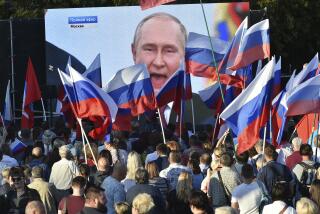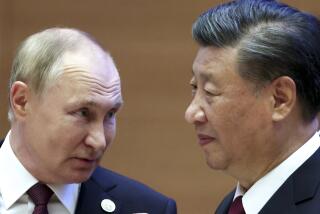Insider : What If Gorbachev Falls? Washington Slow to Draft Plan B : His country is in chaos, his political future shaky. But the White House is hoping that its Soviet ally--or at least his friendly foreign policies--will survive.
- Share via
WASHINGTON — What if Mikhail S. Gorbachev falls?
That question is increasingly on the minds of top U.S. officials these days as the Soviet Union--and its president--are buffeted by rapid deterioration of the country’s economy, mounting ethnic violence and, now, the possibility of serious food shortages.
But surprising as it may seem, the United States has no formal contingency plans for use if the Soviet leader is ousted, quits or otherwise leaves office, and U.S. officials seem to be in no hurry to put together such a program, despite the growing turmoil there.
Part of the reason for the void is simply the slow pace of traditional analytical procedures.
The CIA has just finished preparing a new national intelligence estimate that looks closely at prospects for stability in the Soviet Union--including a variety of scenarios under which Gorbachev may survive or fall.
If the White House decides it is necessary, the National Security Council will set up an interagency task force to formulate contingency plans. Some expect the order to be handed down soon. “We’re ready with some ideas whenever they get ready for them,” one State Department official said.
But the seemingly leisurely approach also reflects a belief--both within the U.S. government and among outside Sovietologists--that any new Soviet leadership is almost certain to follow the same foreign policies as Gorbachev.
Like Gorbachev’s, any new Soviet government would need access to food, medical help and economic aid while it is trying to calm the domestic chaos. That means no threats of nuclear strikes and no efforts to retake the former East Europe satellites.
Moreover, there is increasing confidence here that Gorbachev can keep the lid on events in the Soviet Union--even if it means relying on military force.
He has rejected demands to give up more political and economic authority, which would have eroded his ability to control events there. And he has endorsed the use of force--ostensibly to protect the military but potentially to fight demonstrators, as well.
“This could lead to confrontation and conflict,” a U.S. official admitted. “It’s very volatile right now, with these wild press accounts of ‘Lithuanian forests filled with armed bandits’--much like the Soviet press said about Czechoslovakia just before the (1968) invasion.
“One inadvertent spark could set off an explosion,” he added. “You saw that Gorbachev canceled his trip to Norway” next Sunday and Monday to receive the Nobel Peace Prize.
Still, some officials suspect that the new optimism toward Gorbachev may reflect Administration hopes rather than Soviet reality. Only reluctantly has the Administration moved to broaden its contacts with other Soviet leaders, for fear of undermining Gorbachev.
“You know how intelligence estimates can be tailored to fit existing policy,” said one official familiar with the estimating process.
Another factor in the slow pace of contingency planning might be that policy-makers such as Secretary of State James A. Baker III may feel that, because of the close contacts with Soviet officials, they know more than their Soviet experts about developments in Moscow.
“Baker has logged more hours with senior Soviet leaders than any American official in memory,” said RAND Corp.’s senior Soviet analyst, Arnold Horelick. “When no one saw Russian leaders, then the remote expertise of trained specialists carried more weight. Now, the danger is that some of these people will think they are their own Soviet experts.”
Finally, U.S. analysts say there may be little that the West can do to intervene if Gorbachev is ousted or steps down for some reason.
Moscow already is on notice by the world community that if massive political arrests and killings of demonstrators occur--like the Tian An Men Square massacre in China--the Soviet Union will jeopardize its Western economic goals, officials say.
“Fundamentally, we don’t have much leverage,” one official complained. “Humanitarian aid, diplomatic warnings, maybe economic sanctions. That’s about it.”
U.S. officials cite three scenarios for Gorbachev’s future, which are reflected in the new intelligence estimates. They are, in order of probability:
* Gorbachev survives but must crack down between now and spring, possibly even imposing martial law to maintain order, ease food distribution and suppress speculation in scarce goods. “He uses an iron fist,” a senior official explained, “but with the benevolent goal of preventing a more severe explosion later. But unrest, violent clashes seem to be in the cards.”
* Gorbachev leaves and is replaced by a regime that is harder-line on the political integrity of the union, but more radical in allowing economic freedom to republics. One or more of the major republics, such as the Ukraine, secede within two or three years after efforts to intimidate them fail.
* Gorbachev “escapes forward” by sharing power rather than losing it, agreeing to the devolution of economic and political authority to the republics. But he becomes increasingly irrelevant as the union fragments. Without central leadership, the Soviet Union becomes even less a player in world affairs than it is today.
The United States and its European allies want to prevent any resort to violence which, among other outcomes, could produce a destabilizing flood of refugees from the Soviet Union into Eastern Europe and farther westward.
Food and medical aid, which might help forestall an explosion, already are being provided, primarily by Germany. U.S. officials remain unconvinced that massive famine will occur. They note that Gorbachev’s pleas for such help have yielded pledges of about $15 billion.
More to Read
Get the L.A. Times Politics newsletter
Deeply reported insights into legislation, politics and policy from Sacramento, Washington and beyond. In your inbox twice per week.
You may occasionally receive promotional content from the Los Angeles Times.









